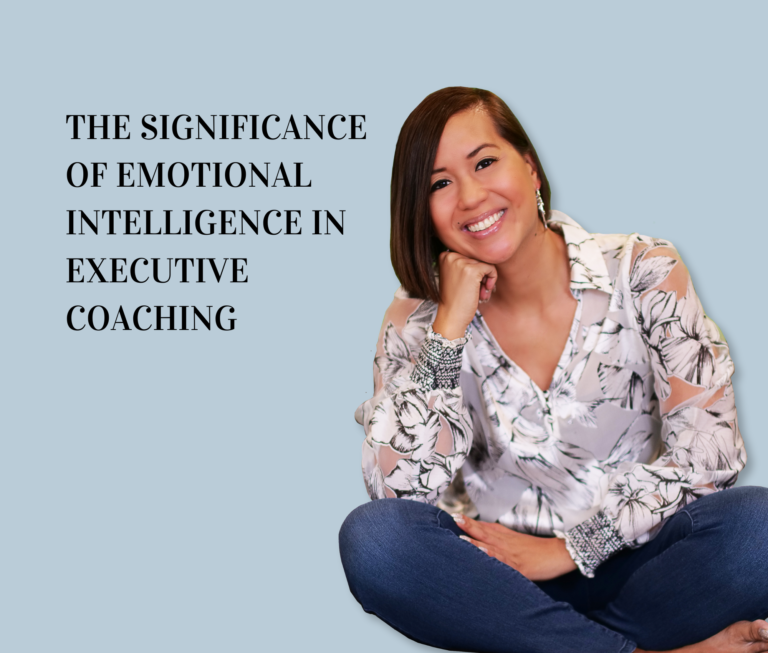
Introduction
In executive coaching, Emotional Intelligence (EI) has become a cornerstone for determining leadership success along with the success of organizations. EI is the capability to interpret, control and use emotions by oneself or with other people. This blog investigates the place of EI in executive coaching by covering its definition, integration, impact on leadership, practical strategies for development, and real-life examples of its effectiveness. Comprehending and utilizing EI can be the key to a lot of things in executive coaching. More effective and resilient leaders can be the result of this coaching.
Understanding Emotional Intelligence
Definition of Emotional Intelligence
Emotional Intelligence comprises of not only recognizing and comprehending feelings, but also effective management and social relations. The following aspects are among its key elements:
- Self-Awareness: Being aware of one’s behavior, mannerisms, and personality and how it impacts the people and environment around them
- Self-Regulation: The way a person manages their feelings, controls impulses, stays calm and flexibility
- Motivation: The regulation of emotions of a person that promotes goal-oriented behavior, and the ability to endure difficulties
- Empathy: The ability to understand and feel emotions of others, which leads to successful leadership
- Social Skills: Professional relationships, communication skills, conflict management, and teamwork
The EI attributes are critical for leaders in executive coaching to create a positive working atmosphere, be wise in their choices, and develop close connections with their teams.
The Evolution of Emotional Intelligence
Development Over Time
- EI is a very lively element which gets better as a person grows and gains more life experiences.
- Life experiences, including job challenges and disagreements with people, clearly have the upper hand in emotional intelligence (EI).
- Mindfully recovering memories and learning from experiences can be a couple emotional maturity factors.
Impact of Life Transitions
- Emotional intelligence can be increased or derailed under life circumstances such as starting a new job or losing a close one.
- Those who appear to have mastered the art of the coping strategies are those who have strong emotional development.
- Being coached or mentored can accelerate the process of EI development.
Role of Education and Training
- Formal education and professional training programs keep on including more and more EI components.
- Training and workshops make self-awareness as well as social skills better.
- Ongoing Education on EI brings about improvement in leadership skills and interpersonal relationships.
Biological Factors:
Along with the impact of environmental factors, biological factors such as genetics and neurobiology also play a significant role in EI. Genetic differences and variations in brain anatomy can be the reason behind an individual’s feeling and using emotions.
Brain chemistry can likewise be a factor in emotional functioning and intelligence. The biochemical basis of EI is crucial not only from a neuroscience perspective but also for comprehending how emotional processes operate and their effects on overall emotional IQ.
Misunderstandings about Emotional Intelligence
- EI vs. IQ: A popular misconception is that both EI and Cognitive Intelligence (IQ) are the same. IQ is the measurement of cognitive abilities and technical knowledge, however EI is steering toward the sentimental mastery and management which is, undoubtedly, necessary for leadership and interpersonal relations. EI particularly embraces emotional and social skills that are indispensable for effective leadership.
- EI is Inherent: Several hypotheses say EI is a natural capability as opposed to a skill that can be forged over time. Nonetheless, studies suggest that certain exercises and training can enhance EI. The growth mindset way of thinking gives individuals the possibility to continuously and gradually perfect their EI skills, which can consequently lead to the improvement of emotional regulation and deepening of interpersonal effectiveness.
The Link between Emotional Intelligence in Executive Coaching
Emotional Awareness and Self-Regulation
- Self-awareness: The prime objective of executive coaching is to allow leaders to gain greater insight and awareness into themselves. This entails identifying their emotional stimuli, exploring the way they react, and evaluate how their feelings affect them both in terms of actions and choices. Coaches employ different approaches such as personality tests and reflective practices, which are the tools and exercises for the enhancement of leaders’ self-awareness. This pillar of awareness is the very first step that allows the leaders to control their emotions better which, in turn, helps them to boost their leadership performance.
- Mastery Techniques for Self-Regulation: People who achieve self-regulation can stay calm when faced with pressure and make right decisions at critical times. Executive coaches help create these competencies through methods like mindfulness training, stress management approaches, and resilience enhancement programs. Mindfulness practices, for example, make leaders stay in the “here and now” and calm down, which reduces the effect of negative moods on a decision-making process. Stress management strategies, which include things like relaxing exercises and time management techniques, are also used to help leaders deal with challenges with more calmness and efficiency.
Compassion and Interpersonal Abilities
- Building Empathy: The ability to understand and communicate other people’s feelings is a key factor in emotional intelligence. In executive coaching, leaders will be able to expand on their empathic abilities to gain trust, incentivize teamwork among their team or improve the dynamics of a working group. For instance, coaches use active listening skills, perspective change or even feelings validation among other methods when helping leaders enhance these skills. There are practices like role-playing or empathic listening that can assist in enhancing a leader’s ability to react with compassion that may result in better relationships with team members as well as help resolve conflicts more easily.
- Social Skills Improvement: Interpersonal social skills are the important means that help, as people navigate social relationships and thus, a positive work environment is formed. Executive coaches empower clients to master their social skills, paying close attention to the dynamics of communication, active listening, and conflict management. Coaches may make use of communication workshops, feedback sessions, and interpersonal skills training for these leaders to develop these competencies. Strengthened social skills increase leaders’ capability to relate to their teams more efficiently, to resolve conflicts in a constructive manner, and finally, to create a collaborative and understanding atmosphere in the workplace.
The Impact of Emotional Intelligence on Leadership Development

Enhanced Leadership Effectiveness
Strategic Decision-Making
People with high EI know how to make reasonable decisions which is a fundamental attribute of effective leadership. EI helps leaders to consider both the emotional and the rational sides, which results in more careful and strategic decision-making. This ability is crucial for going through intricate and high-pressure scenarios and on such occasions, it is possible for leaders to manage stress effectively and be attentive to long-term goals. With executive coaching, leaders can gain more efficient decision-making by practicing reflective practices and scenario analysis.
- EI equips leaders to analyze both emotional and rational elements.
- Reflective practices and scenario analysis are utilized in coaching to enhance decision-making.
- Emotional insights and logical analysis together contribute to the development of strategic thinking.
In executive coaching, leaders are taught to refine their skills of responding to challenging situations with a balanced strategy, which would then lead to the improvement of leadership effectiveness and strategic thinking.
Inspiring and Motivating Teams
It is key for leaders to effectively inspire and motivate their teams. This connection improves engagement, commitment, and the creation of a good work environment.
- High EI assists leaders in authentic communication with teams to motivate and inspire through empathy.
- Emotional intelligence training is mainly concerned with empathy, emotional awareness, and social skills.
- More EI signifies deeper commitment from the team and thus, a more cheerful atmosphere at work.
Coaching sessions focus on the areas of authentic communication, goal-setting methods, and vision articulation. This process usually involves personal coaching sessions that assist leaders to properly align their personal values with organizational goals, thereby forming a strong vision that is in sync with the team. Utilizing emotional intelligence, managers can, therefore, manifest a workforce that is more encouraged and involved, thereby bringing a rise in productivity and, consequently, becoming a partner in the course of the whole organization.
Improved Team Dynamics
Conflict Resolution
Leaders who have a high level of EI manage team conflicts well. Their capacity to absorb and understand the differences of opinions, as well as facilitate open communication, provides them with a unique opportunity to tackle the problems requiring empathy and objectivity. In this way, constructive conflict resolution becomes possible and team solidarity gets strengthened. Conflict resolution strategies, such as mediation training and negotiation exercises, are among the methods used in executive coaching to teach leaders how to deal with conflicts.
- EI provides leaders with the ability to comprehend diverse opinions and express their thoughts clearly.
- Through techniques such as mediation, leaders can approach negotiations and conflict resolution more effectively.
- Dealing with conflicts that involve understanding and being fair enhances the development of team cohesion.
Such skills are at the core of the team-building strategies that foster a peaceful and efficient work environment. Coaches also apply stress management strategies and time management techniques to assist the leaders in keeping their calm during conflicts so that the resolution efforts are concentrated and effective.
Fostering Collaboration and Trust
Collaboration promotes cooperation and reliability in teams. Leaders who have a high degree of EI build a harmonious and collective work environment by putting into practice their empathy, good communication, and social skills. This friendly environment helps team members to be more open with each other and develop stronger interpersonal relationships.
- Leaders with a high level of EI create cultures of support and teamwork.
- Trust is built through empathy, good communication, and social skills.
- Stronger interpersonal relationships ensure cooperation and thus team success.
Coaches help leaders to improve these parts of emotional intelligence by giving them specific exercises in team-building and relationship management. For instance, workshops on team building techniques and feedback mechanisms help leaders build a culture of trust and mutual respect. Strengthened collaboration and trust result in better performance, increase in innovation, and positive organizational culture. By instilling these qualities in their leaders, the leaders can contribute to the success of their teams and create a space that allows for continuous improvement and growth.
Personal Growth and Development
Cultivating a Growth Mindset
EI is hand in hand with self-development and growth. The leaders who emphasize mindset coaching are able to develop a growth mindset, which is the key factor for accepting challenges and the desire for continuous improvement. Personalized coaching gives leaders the opportunity to learn a mindset that takes failures as a learning opportunity and continues to be resilient in the case of obstacles.
- Growth mindset aids executive leaders in overcoming obstacles and achieving excellence.
- Specialized coaching makes the applicants realize that mistakes are chances to improve.
- Resilience is the main factor in getting over difficulties and going on with personal development.
Building Resilience Through EI
Mindset coaching is a tool that assist leaders to enhance self awareness and other similar abilities including
- Self-awareness allows you to have a better understanding of your own emotions and of others.
- Self-regulation is the ability of leaders to control their emotions to a great degree.
- Emotional intelligence training is a contributing factor for a leadership style that is both strong and flexible.
Practical Strategies for Developing Emotional Intelligence
Coaching Sessions
One-on-one coaching sessions that are personalized to the needs of the individual offer immediate help in acquiring EI. Coaches assist leaders in identifying and overcoming specific EI-related challenges and goals by providing feedback, guidance, and actionable strategies.
Coaching activities may include exercises for self-awareness, emotional regulation, and social skills development, customized to the individual leader’s needs. The personalized approach enables leaders to experience significant changes in their EI skills.
Continuous Practice and Feedback
Regular reflection is a key practice for developing EI. Self-reflection monitors their emotional reactions, interactions with others, and progress in EI development. Journaling, self-assessing tools, and feedback from peers can help leaders be within their own growth rate, thus identifying areas for improvement. Continuous reflection helps in acquiring EI skills and allows leaders to mend their way of dealing with real-life situations in a continuous manner.
Creating a Supportive Environment for EI Development
Developing Emotional Intelligence (EI) is not only about being aware of oneself and practice but also an atmosphere that supports it is needed for it to blossom.
Surrounding Yourself with Positive Influences
- Engage with Emotionally Intelligent Individuals: Look for those who are emotionally intelligent among your mentors, colleagues, and friends. Imitating their communication and empathy skills can become your real-life EI practicum.
- Encourage Constructive Feedback: Talking constructive criticism is essential in order to develop your self-awareness and to hone your emotional skills.
- Foster Emotional Support Networks: Build relationships that are based on the real exchange of feelings with those who are not afraid to get vulnerable. These links deliver your emotional agility and interpersonal skills.
Limiting Exposure to Negative Media
- Curate Your Media Consumption: Uplifting and inspiring content should be actively selected instead of distressing. Don’t have a heavy diet of negative news or social media conflicts that drain the emotional battery.
- Focus on Positive and Growth-Oriented Content: Interact with media that encourages personal development, emotional resilience, and productive communication. In fact, this method aids to see an outer angle and that makes EI stronger.
- Protect Your Emotional Health: By blocking toxic influences, your mind can be filled with positivity and this is necessary in order to develop and keep your emotional intelligence.
Real-Life Examples
Success Stories
Here are success stories of leaders I’ve coached who have successfully integrated EI into their lives. My clients have experienced heightened team performance, more efficient leadership, a better workplace environment, resolution of conflicts, communication improvement, and team building, which led to an increase in productivity and happiness.
Conclusion
Recap and Key Takeaways
- EI plays a decisive role in the effectiveness of leadership and the success of organizations.
- EI is integrated in coaching through the acquisition of self-awareness, self-regulation, empathy, and social skills.
- Workshops, coaching sessions, and constant reflecting are effective ways of developing EI skills. Real-life examples and expert insights reveal the changing effect of EI.
Take Action
If you really want to learn and increase in EI, have good relations with your team, and be successful in your career, I recommend you consider executive coaching. Grow your EI skills, and the results will speak for themselves.
Frequently Asked Questions
What is the importance of EI in executive coaching?
EI boosts decision-making, and it develops team dynamics. Leaders who are EI-oriented, which means they can adjust to complicated interpersonal relations, make fair decisions, and create a pleasing atmosphere at work, therefore, helping the organization perform better.
How can EI be developed through executive coaching?
Driving emotional intelligence can be achieved through the help of an executive coach via a tailoring approach around self-awareness, self-regulation, empathy, and social skills. Coaches use different tools such as reflective practices, mindfulness exercises, and feedback mechanisms to help leaders develop their EI skills.
What are some practical techniques for improving EI?
Practical techniques for the improvement of EI include mindfulness practices, regular reflection, and applying feedback. Yes, mindfulness practices help leaders redirect their attention away from strong emotions and stay in the moment, while regular reflection takes place as a process of continuing EI development. Listening to colleagues and receiving feedback allows one to gain significant evidence into competency levels and suggests improvement areas in emotional intelligence.
How does EI impact leadership effectiveness?
EI helps with better decision making, information sharing and coordination. EI equipped leaders have a higher chance to tackle conflicts, forge trust and motivate their teams towards accomplishment. EI helps leaders deal with complicated issues, cope with stress, and relate to their teams on an emotional level, thus resulting in greater productivity, engagement, and efficiency of leadership.


